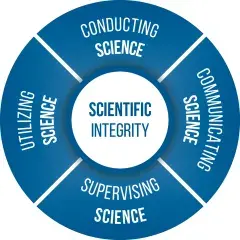Science and engineering play a critical role in the Department’s mission to protect the homeland. From the development and deployment of technologies to support our operators, to the development of evidence-based policy, scientific integrity is critical to ensuring the Department serves the American people.

Scientific integrity at the Department of Homeland Security (DHS) is the adherence to professional practices, ethical behavior, and the principles of honesty and objectivity when conducting, managing, using the results of, and communicating about science and scientific activities. Transparency and protection from inappropriate influence are hallmarks of scientific integrity. Scientific integrity applies to scientific activity conducted, funded, or otherwise supported by any DHS Component (“DHS-sponsored”) and to the DHS workforce. This includes all career and political employees, political appointees, trainees, interns, volunteers, and members of federal advisory committees who conduct, manage, design, evaluate, communicate, or use science to support DHS decision making. Important aspects also apply to DHS contractors, grantees, cooperators, collaborators, and partners who engage or assist in a DHS-sponsored scientific activity, as required in their contract, grant, Cooperative Research and Development Agreement, memoranda of understanding, or other agreement.
The Science and Technology Directorate (S&T) is the lead for Scientific Integrity for the Department and the Executive Director of the S&T Office of Science and Engineering (OSE) serves as the DHS Scientific Integrity Official (SIO).
What Is Scientific Integrity?
Scientific integrity results from adherence to professional values and practices, when conducting and applying the results of science and scholarship. It ensures:
- Objectivity
- Clarity
- Reproducibility
- Utility
Scientific integrity is important because it provides insulation from:
- Bias
- Fabrication
- Falsification
- Plagiarism
- Outside interference
- Censorship
- Inadequate procedural and information security
Scientific Integrity at DHS
Integrity and transparency have been hallmark traits of our scientists and engineers since the Department was established in 2002. The DHS Scientific Integrity Directive builds on these traits and focuses on key areas such as:
- Promoting a culture of discovery and integrity that supports freedom of inquiry, open discussion, and public access to data that is critical to a healthy scientific ecosystem.
- Ensuring the free flow of scientific information in the communication of scientific activities, findings, and products.
- Supporting the decision-making processes with quality, accuracy, and transparency of scientific information used to support decision making.
- Ensuring accountability of the scientific record and providing clear guidance on how to report concerns and allegations of violations.
- Ensuring protections that support the selection and retention of candidates based on their scientific and technical knowledge, credentials, experience, and integrity, and that protect individuals who report allegations of compromised scientific integrity in good faith.
- Promoting and facilitating professional development of federal scientists and engineers by encouraging timely publication of research; supporting attendance and presentation of research; promoting service as peer reviewers or editors; encouraging participation in professional societies; permitting government scientists to receive honors and awards for contributions to scientific activities; and performing outreach and engagement activities as part of their official duties.
- Adhering to the Federal Advisory Committee Act to support the credibility, quality, and transparency of the Department’s research portfolio.
How Do I Report a Violation or Allegation of Loss of Scientific Integrity?
Federal employees should direct allegations of a loss of scientific integrity in DHS-sponsored scientific activities to the SIO or the DHS Office of Inspector General. To report an incident involving the loss of scientific integrity to the SIO, please contact: Scientific_Integrity@hq.dhs.gov.
Include the following details in the description:
- Date, circumstances, and location of the incident.
- Explanation of how the allegation relates to the loss of scientific integrity and the impact of the alleged loss of integrity.
- Statement explaining any personal or professional extenuating circumstances, non-scientific disagreements or conflict(s) of interest the person making the allegation has with the subject(s), entity(ies), or situation(s) named in the allegation.
Where Can I Access the DHS Scientific Integrity Directive?
The DHS Scientific Integrity Directive was updated in 2024. Additional details will be contained within a DHS Scientific Integrity Instruction, which is expected in 2025.
